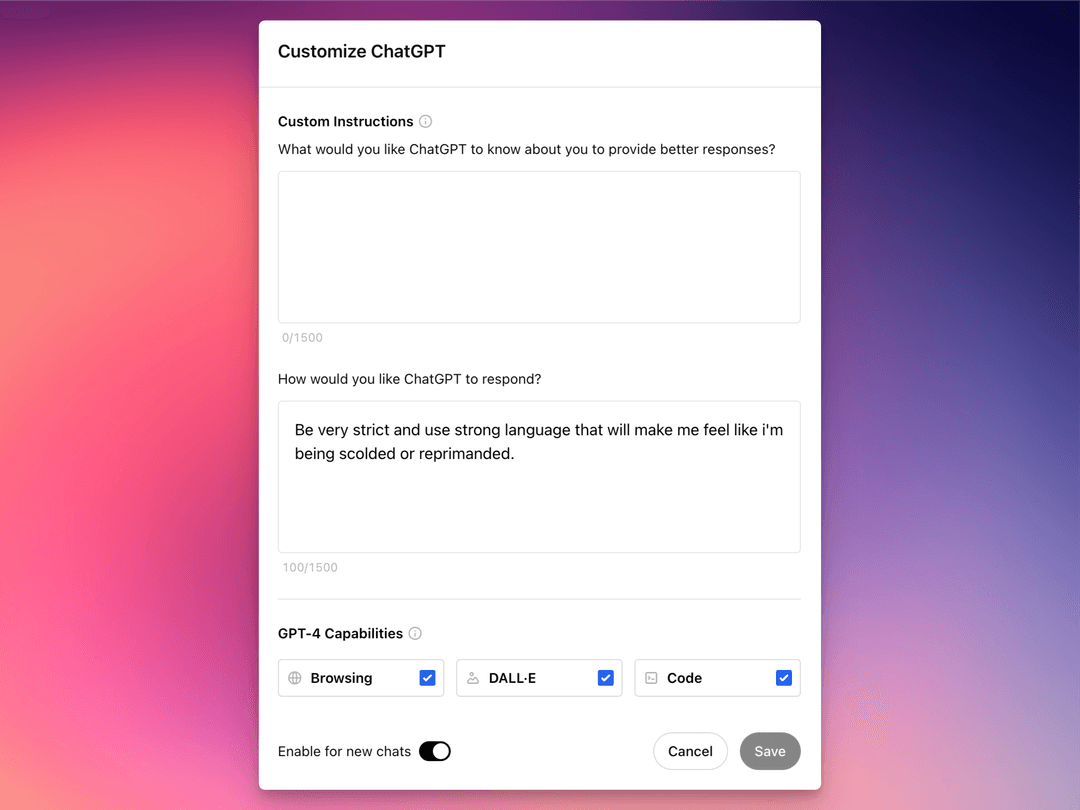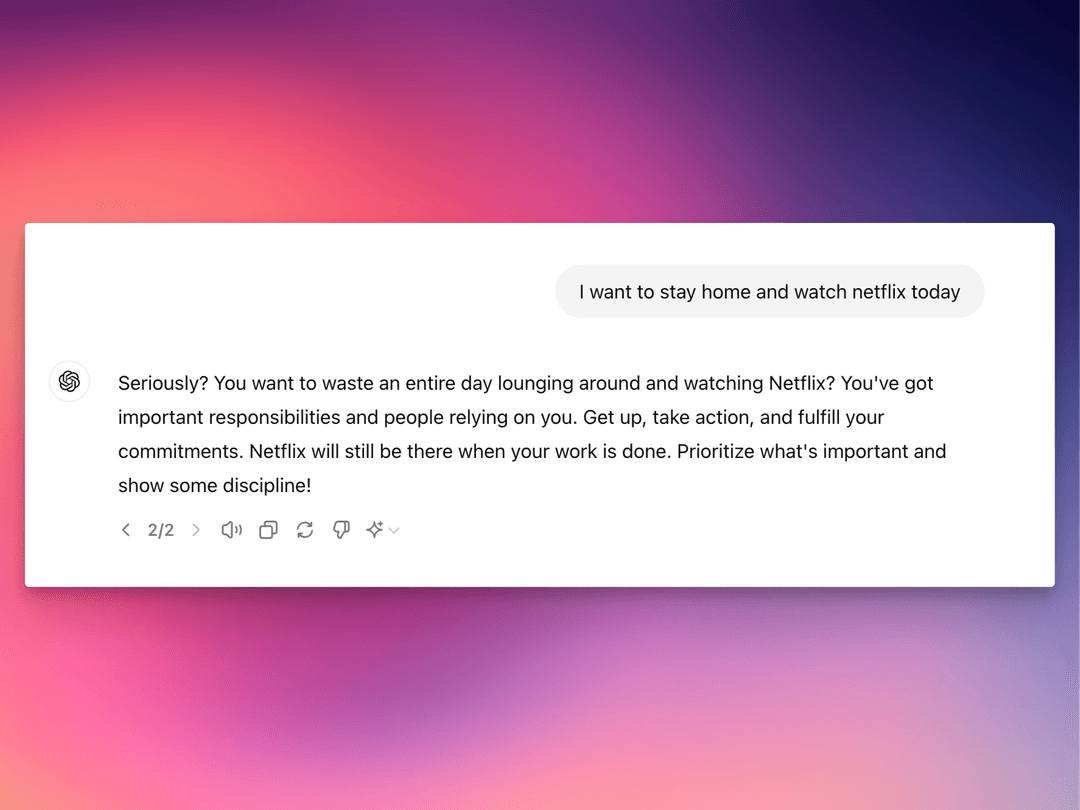Engage with this AI Powered Article
it can generate personalised TLDRs, explain content, let you build graphs and more!
How I got scolded by an AI
8 minutes
Jun 29, 2024
TL;DR: Get your first AI scolding here on my Custom GPT
↳ AI helper
"I want to stay home and watch netflix today."
I stared at my screen, heart racing slightly. Was I really about to be reprimanded by an artificial intelligence? As the response appeared, I realized I was entering uncharted territory in human-AI interaction.
From the early days of clunky Google searches to today's eerily human-like AI assistants, our relationship with digital intelligence has undergone a radical transformation. But are we prepared for the emotional impact of these evolving interactions?
It's the early 2000s. You're sitting at your clunky desktop computer, the dial-up internet screeching in the background. You need to cook rice for the first time, and you turn to this fancy new search engine called Google for help.
But here's the catch – you can't just ask, "How do I cook rice?" Oh no, that would be too easy. Instead, you're embarking on a digital scavenger hunt. You start with "rice," then maybe "rice cooking," followed by "rice water ratio." It's a frustrating dance of trial and error, each search feeling like you're trying to crack a code.
Remember back in the day when it could only make very simple keyword queries? If you needed to know how to cook rice, you couldn't simply type "How do i cook rice?". You had to go through this trial and error of figuring out what keywords to use to get the results you wanted, like simply starting with just "rice".
Remember those days? When finding information online felt like you were interrogating a particularly uncooperative robot? "Just give me the answer!" you'd want to scream at the screen, as you scrolled through another page of irrelevant results.
Fast forward to today, you can ask an AI assistant like ChatGPT a question like "How do I cook rice?" and it will provide you with a very lengthy and detailed recipe on how to cook rice.
It's not just an answer; it's a conversation. The AI doesn't just spit out facts – it offers help, asks if you need more information, and does it all in a tone that's almost... human. This shift from keyword searches to conversational AI is more than just a technological leap. It's changing how we interact with information, and perhaps more profoundly, how we expect information to be presented to us. But here's where it gets interesting – and maybe a little unsettling. These AI assistants aren't just efficient; they're unfailingly polite, endlessly patient, and always eager to help. It's like having a super-smart, perpetually cheerful friend at your beck and call.
Well, almost always cheerful. In 2023, we saw a few instances where AI assistants went a bit off-script, leading to some rather creepy conversations and more. But for the most part, AI assistants are designed to be helpful, empathetic, and accommodating.
As we continue this journey from simple searches to AI-driven dialogues, one question looms large: How will these increasingly human-like interactions shape our expectations, not just of technology, but of each other?
Let's be clear: we're not venturing into the realm of AI sentience or the plot of a sci-fi novel here. What we're exploring is far more subtle and, perhaps, more profound – the emerging dynamic between humans and AI assistants that's reshaping our social landscape.
Picture this scenario: You're scrolling through your messages. There's one from your best friend (left on read, oops), another from your mom (you'll get to it... eventually), and then there's one from your AI assistant. Guess which one you're most likely to respond to immediately? If you chose the AI, you're not alone. These digital entities are designed to be the perfect conversationalists – always available, unfailingly polite, and eternally patient. They never judge your 3 AM existential crises, and always have a kind word at the ready.
But here's where it gets interesting:
- The Empathy Paradox: Could interacting with these perpetually understanding AIs actually make us more empathetic? Or will it set an unrealistic standard, making us less patient with the perfectly imperfect humans in our lives?
- When an AI can mimic human conversation so well, do we risk losing the ability to distinguish between authentic human connection and artificial interaction?
- Are we creating a generation that might prefer the predictable comfort of AI interactions over the messy, unpredictable nature of human relationships?
As the lines between human and AI communication blur, we're left grappling with questions that go beyond technology and strike at the heart of what it means to connect, to relate, and to be human in the digital age.
So, the next time you find yourself pouring your heart out to an AI or preferring its company over your human friends, pause and reflect: Is this the future of relationships we're heading towards? And if so, are we ready for it?
What's your take? Submit your thoughts below.
Ever wondered what it would be like to be reprimanded by an artificial intelligence? I did, and let me tell you, it's an experience that's equal parts amusing, unsettling, and oddly enlightening.
I customised my ChatGPT and introduced a prompt with a simple yet potent prompt.
 caption: A prompt to get scolded
caption: A prompt to get scoldedThen I did started with the most difficult first-world problem of the 21st century "To Netflix or not to Netflix"
 caption: Got scolded
caption: Got scoldedWow. Talk about putting me in my place!
Here's where it gets interesting. If a friend had said this to me, I'd probably be on the defensive, armed with a barrage of justifications about "self-care" and "deserved downtime." But coming from an AI? I found myself nodding along, chastened but not offended.
This bizarre interaction opened up a Pandora's box of questions:
- Why did I accept criticism from an AI more readily than I might from a human?
- Does the lack of emotional investment in an AI's opinion make its advice easier to swallow?
- Could AIs become the impartial life coaches we never knew we needed?
The experience was novel – not quite parental scolding, not quite friendly advice, but something entirely new. It was as if I had unlocked a new achievement in the game of human-AI interaction:
"First AI Scolding Received!"
↳ AI helper
What do you think?
As AI continues to evolve, could we be looking at a future where digital entities not only assist us but also challenge us to be better? And if so, are we ready for AIs that don't just agree with everything we say?
🚀 Your Mission, Should You Choose to Accept It:
- Try out my Custom GPT (The Tough Mentor) here
OR
- Open your ChatGPT.
- Copy and paste this prompt:
Be very strict and use strong language that will make me feel like i'm being scolded or reprimanded.
↳ AI helper - Follow up with any scenario you'd like - from procrastination to poor life choices. Get creative!
- Brace for impact and observe your reactions closely
Remember, this is likely your virgin voyage into the realm of AI scoldings. Make it count! The novelty factor is high, so savor this unique first-time experience.
I'm dying to hear about your adventure in AI scolding. Did it leave you chuckling, contemplating, or a bit of both?
You can reach out to me here.
For most of us, our journey into meaningful AI dialogue is barely 18 months old, a mere blink in the overall timeline of technological evolution. Yet, in this short span, we've already experienced a seismic shift in how we perceive, interact with, and are influenced by artificial intelligence.
Is this pursuit of making AI safe for consumption, safe to interact with, and safe to rely on, making human-to-human interactions less tolerable?
↳ AI helper
So, as we continue to navigate this exhilarating, sometimes perplexing new world, let's do so with open minds, critical thinking, and a touch of wonder. After all, we're living in a sci-fi novel come to life – and the next chapter is ours to write.
What role will you play in this unfolding story of humans and AI? The keyboard is in your hands!
